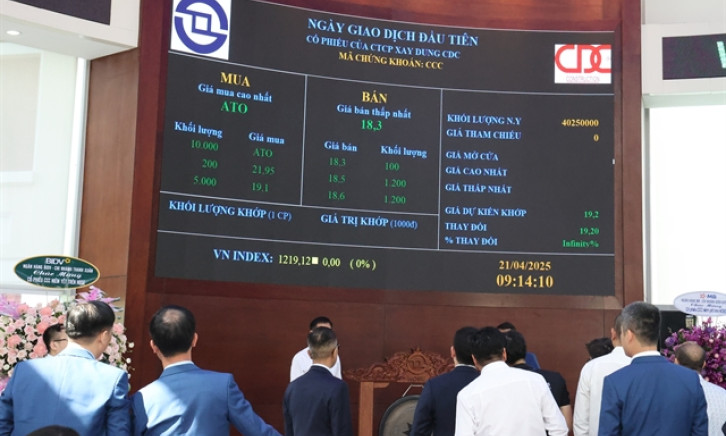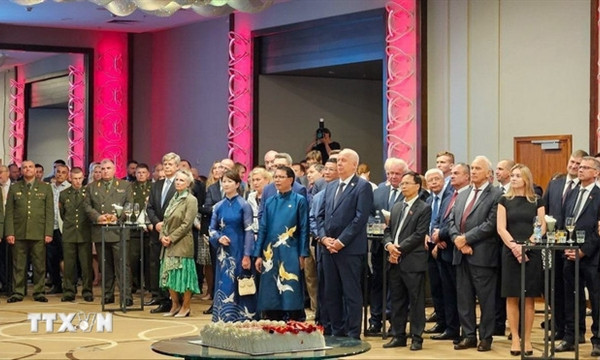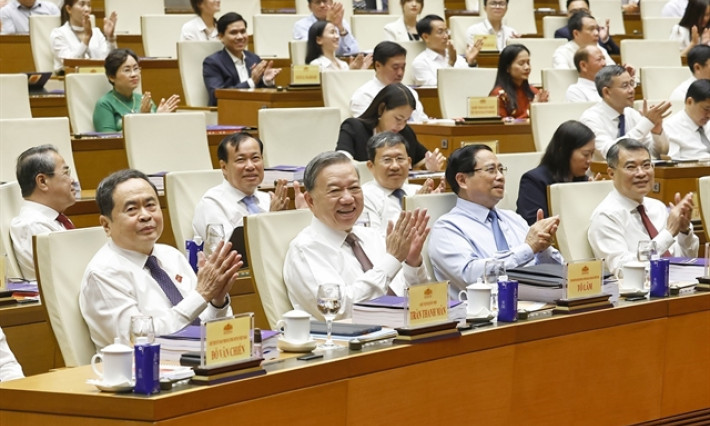More opportunities urged for women and girls: insights from young feminist forum
The Asia-Pacific Regional Civil Society Young Feminist Forum on Beijing+30 took place in Bangkok, Thailand as a side event of the Beijing+30 Review Conference. Three outstanding Vietnamese representatives at the Young Feminist Forum spoke to Việt Nam News reporter Thu Trang about their points of view on gender equality and women’s empowerment.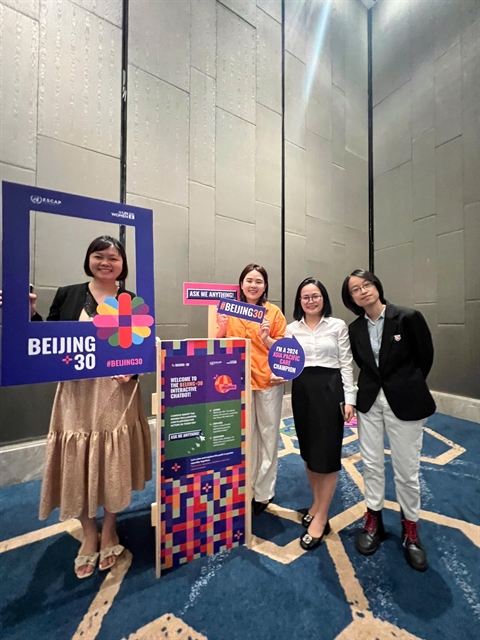
The Asia-Pacific Regional Civil Society Young Feminist Forum on Beijing+30 took place in Bangkok, Thailand as a side event of the Beijing+30 Review Conference. Three outstanding Vietnamese representatives at the Young Feminist Forum spoke to Việt Nam News reporter Thu Trang about their points of view on gender equality and women’s empowerment.
Tống Khánh Linh, Deputy Director of the Centre for Education Promotion and Empowerment of Women (CEPEW)
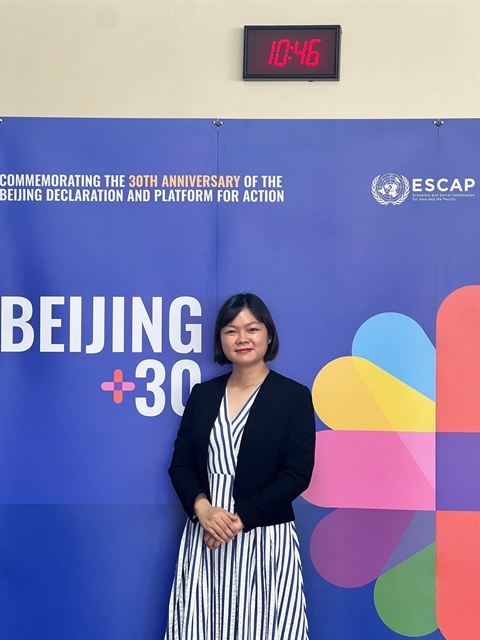
The Young Feminist Forum has been inspiring. This is the first formal regional attempt to integrate young people’s voices and participation in the gender equality policy agenda. At the forum, we had opportunities to discuss and identify young feminist priorities and actionable recommendations on gender equality from a youth lens, building upon those emerging for the Asia-Pacific region in the Beijing+30 review.
Corresponding to the Centre for Education Promotion and Empowerment of Women (CEPEW)’s research and expertise focus, I participated in and contributed to two thematic discussions. The first is on accountability frameworks for inclusive digitalisation. I shared the importance of gender mainstreaming in digital laws and policies, bridging the gender gap in digital standardisation and participation in the digital policy-making process, and ensuring sex-disaggregated data is collected and made accessible to inform laws and policies. While the rapid digital transformation in Việt Nam champions “leaving no one behind” and has indeed empowered many women and girls, especially those from disadvantaged regions and groups, our research shows that current national strategy on gender equality (2021-2030) has not mainstreamed emerging digital issues, and the national strategy on digital transformation (until 2030) has not addressed digital-related gender challenges. Research, evidence, and awareness of gender issues in digital transformation remain limited across national, regional, and international levels.
The second discussion is on decision-making and political participation. I shared four recommendations at the forum, including gender mainstreaming in laws and policies; enhancing women’s political leadership in STEM ministries, especially in top decision-making positions; promoting men’s participation to contribute to substantive equality for all; and engaging women’s experiences and voices in peace-making processes.
After the Fourth World Women Conference in Beijing in 1995, Việt Nam has achieved significant progress in gender equality at institutional, legal, and practical levels. I want to mention the national and local gender equality and women’s advancement agencies. International and local organisations have closely cooperated with these institutions to promote substantive equality and women’s rights in the country.
Adopting the 2006 Law on Gender Equality and the 2007 Law on Domestic Violence Prevention and Control (amended in 2022), as well as different national strategies for gender equality and women’s advancement, are the most significant achievements in strengthening legislation in this field. These laws and policies benefit not only young people but also youths who have recently actively participated in the formulation, implementation, and evaluation of this legislation.
Việt Nam has also made progress in women's political and workforce participation. In the election of deputies to the 15th National Assembly in 2021, the proportion of female representatives in the National Assembly increased to 30 per cent, the highest since 1976, and even higher than the global average of 25 per cent. Notably, Vietnamese women's workforce participation is approaching that of men (72 per cent for women and 82 per cent for men). These figures represent important legacies for younger generations in the political and socio-economic spheres.
In an uncertain but fast-changing world, women and youths face many challenges. Việt Nam is no exception. In the framework of this article, I would mention gender stereotypes and age-based discrimination from family to societal levels that not only women and youths, but also men and elderly people face. The development of artificial intelligence (AI) will contribute to the development of the world, but also to the escalation of disinformation, fake news, gender bias, and hate speech based on gender, age, ethnicity, abilities, and so on. These challenges and beyond may limit the rights and potential of women and youths if not properly and cautiously regulated.
Recently, CEPEW has been implementing a project on 'Promoting women’s participation and leadership in the digital transformation process in Việt Nam through research, communication, and advocacy activities', with support from the Canada Fund for Local Initiatives. We have been reviewing the gender responsiveness of Việt Nam’s digital policies and women’s participation in digital policy-making. Preliminary findings from our research suggest that gender stereotypes are still deeply rooted in our society, preventing girls from pursuing STEM education and careers. Subsequently, women have not been playing decision-making roles in digital standardisation.
With rapid digital transformation and AI fundamentally restructuring the labour market demands, Vietnamese women and young girls will be left behind without continuous and concentrated policies and investments to enhance their digital skills and active participation in digital industries. Yet, the danger is when gender equality is assumed to have been achieved, by looking at the surface statistics of the ratio of women’s access to mobile phones or the Internet. Meanwhile, the real challenge lies in enabling women to effectively use their access to mobile phones and the Internet to generate incomes and ensure their livelihoods.
Việt Nam is in the process of amending the 2006 Law on Gender Equality. I hope this amendment will create a comprehensive law that covers direct and indirect discrimination against women and men belonging to different backgrounds including race, ethnicity, ability, gender identity, sexual orientation, and others. The law also includes all civil, political, economic, social, and cultural affairs. The gender mainstreaming process should also be more detailed in the amended gender equality law.
In the last election in 2021, more than 45 per cent of the National Assembly candidates were female, instead of the 35 per cent required by current electoral law. This number suggests the possibility of an amendment that legally mandates a gender quota of at least 45 per cent of candidates of each gender in the official list. Such an amendment would help reach a target of 35 per cent of female elected deputies at the National Assembly and People's Councils at all levels. This target was mentioned in the previous strategy for gender equality and recommended by the United Nations Committee for Elimination of Discrimination Against Women (CEDAW) to Việt Nam.
Gender-based violence is also a field that I would like to see improve in Việt Nam. Two national surveys on domestic violence against women show that two-thirds of interviewed women confirmed violations by their husbands and partners. The ratio of women with disabilities faced with gender-based violence was still higher. However, we lack national data on other kinds of gender-based violence. I wish Việt Nam had a comprehensive national survey that could cover different types of gender-based violence against women and men, girls and boys. It would help inform legislation and allocation of resources to solve the issues.
Finally, as expressed by many other young female colleagues at the Young Feminist Forum, we wish to see not just tokenisation of women’s participation, but authentic participation in the political sphere, especially in top decision-making positions. We also want to see more opportunities for the involvement of women under 35 in political leadership in the country.
Đặng Thuỳ Dương, LGBTI (Lesbian, Gay, Bisexual, Transgender and Intersex) Rights Programme Manager under the Institute for Studies of Society, Economy and Environment (iSEE)
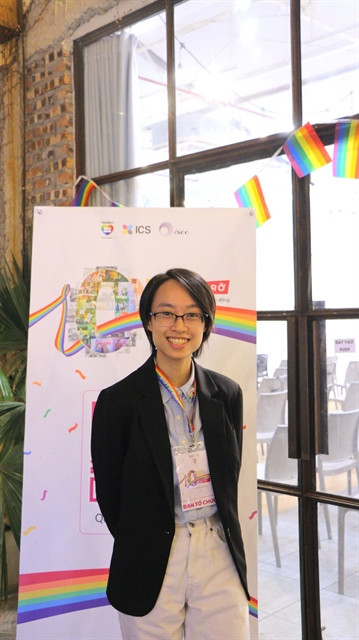
At the forum, I expressed gratitude for the opportunity to be part of a historic youth space under the Beijing+30 framework in the Asia-Pacific. With this opportunity, I emphasised the importance of feminist leadership in comparison with traditional women's leadership, particularly in the context of Việt Nam. I shared that young feminists have an important role in shaping a new vision of leadership – one that embraces the feminist values of inclusivity and collective action. This can be achieved through intergenerational and intersectional dialogue, where we bridge the gap between experienced activists and younger feminists, to promote a vision of feminist leadership that is transformative for all women and marginalised communities.
Việt Nam has made great strides aligned with its principles of equality and non-discrimination. Some significant actions include removing the prohibition on same-sex marriage, legalising the right to gender affirmation (although the draft Law on Gender Affirmation is experiencing some disheartening delays), and issuing a declaration that being LGBT is not an illness. In terms of society and culture, there has been a noticeable shift towards greater acceptance and visibility of the LGBTI community, with more public events, increased representation in media and public discourse and growing support from diverse sectors, including the business community.
In the past few years and -- as can be expected -- in the years to come, the LGBTI community has faced and will continue to face challenges amid rising anti-gender narratives. While Vietnamese society has had a significantly positive shift in public attitude towards LGBTI people since 1995, we’re also witnessing a rise in anti-LGBTI rhetoric, mostly in cyberspace for now, which is directly hurting LGBT youth and fuelling resistance within society.
Hopefully, in the near future, we will see a shift toward a more inclusive understanding of gender equality, embracing gender-diverse people beyond the binary framework. In the shorter term, I’m looking forward to seeing the review process of the draft Gender Affirmation Law picked up where it was left off (heading towards being passed), and same-sex marriage legalisation being considered for the next revision of the Marriage and Family Law.
Nguyễn Khánh Linh, Deputy Director of the Social Affairs Division under the Centre for Women and Development (CWD)
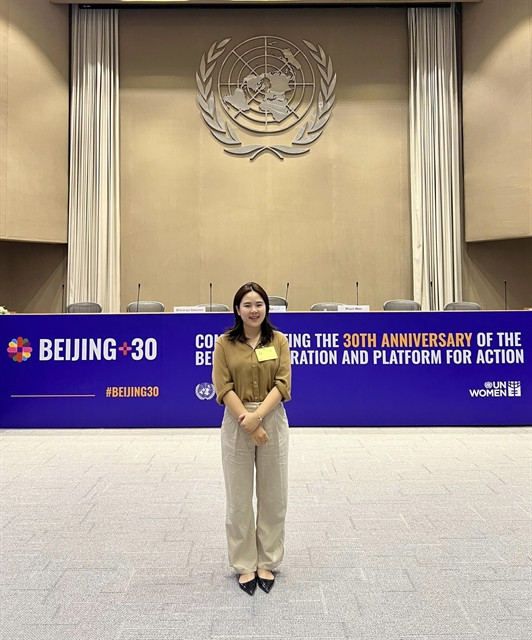
The youth forum was a great opportunity for me. At the forum, I saw the great energy of young people from different countries in the region, which showed the deep concern of the younger generation about the issues that women and children have been facing. Each young person expressed their wish for strong and sustainable development and committed to robust actions to create positive change and respond to current and future issues.
As a young person working in the field of gender equality, focusing on implementing responses and ending violence against women and children, I shared practical lessons learned during my work in Việt Nam. Many of these lessons came from the work being done at the Peace House and the efforts of agencies, organisations and individuals in the country to protect women and children from gender-based violence.
Participants at the forum emphasised the importance of intersectional coordination, collecting data on gender-based violence and investing in a budget for victim support and protection activities, and proposed activities to connect and share experiences between countries.
All of the delegates were impressed with the efforts of the Peace House under the Việt Nam Women's Union, recognising the activities as important work to end violence against women and children.
Achievements in implementing the Beijing Declaration and Platform for Action in Việt Nam have demonstrated the Government's strong concern for this issue. These achievements include the Government's work to refine relevant policy and legal systems, prioritising the promotion of gender equality, developing programmes and activities to raise awareness in the community, and enhancing the full and responsible participation of concerned organisations.
Empowerment is important because when encouraged to participate, the younger generation will feel responsibility and turn it into action to improve themselves, contribute their voices to the community and create positive change.
In the new era, women and the younger generation may face difficulties if they do not have the opportunity and potential to access rapid changes in technology. This is especially true for women and young people in mountainous or remote areas and on islands. The development of information technology also brings safety risks for women and children, such as being exploited for their images or harassed, abused, or scammed online. Women who are victims of domestic violence are increasingly controlled through the use of tracking and positioning devices.
Climate change is also a major challenge that can limit the potential of women and youths because they are more vulnerable than men to environmental and climate risks. According to the results of a survey conducted by the Ministry of Labour, Invalids and Social Affairs in 2022, 81.9 per cent of respondents said that the level and scope of vulnerability and negative impacts on women and children are greater than men in the face of environmental and climate risks. This is especially true for groups of women who are already vulnerable due to multi-layered inequality, such as ethnic minority women, women in rural areas, the poor and migrants.
In the years to come, I hope that gender equality issues will continue to receive attention from leaders at all levels from central to local levels, and that gender equality will be integrated into effective programmes and activities.
Gender-responsive budget allocation, especially the State budget for services to support victims of gender-based violence (such as the activities of the Peace House) will hopefully be strengthened to ensure timely and comprehensive support services. Ensuring that victim support services are always ready and respond promptly is an important factor to ensure victims' safety and their legitimate rights and interests, contributing to ending violence.
I hope that women and girls – especially women and girls in disadvantaged areas – will gradually gain the opportunity to access information technology for self-development, ensuring the participation and leadership of women and girls in science, technology, and the digital transformation. At the same time, women will hopefully gain the skills to respond to and minimise the risk of violence, abuse or trafficking through social networking platforms.




